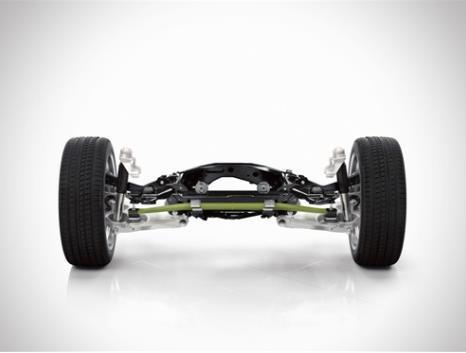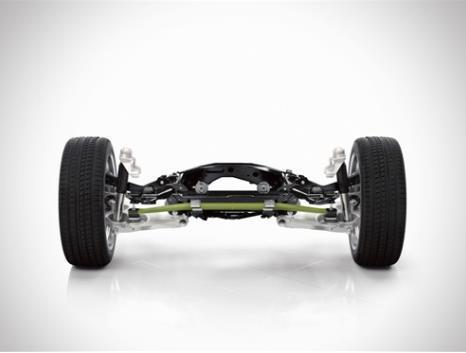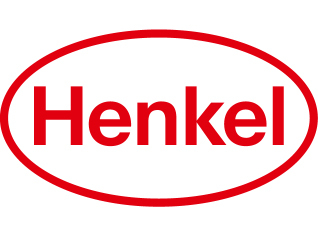SHANGHAI--(BUSINESS WIRE)--Already a permanent feature of automotive engineering, lightweight construction methods continue to steadily gain in importance. Due to automation and cycle time issues, however, manufacturing composite components under mass-production conditions is a major challenge. Now a fiber-reinforced composite leaf spring based on the polyurethane matrix resin Loctite MAX 2 from Henkel is being used in the chassis of the new Volvo XC90, a premium crossover SUV of which the innovative rear axle concept is to serve as a platform for other model series. BENTELER-SGL, a leading manufacturer of composite components for automotive applications, is aiming to produce several hundred thousand of these leaf springs per year.
Composite materials based on glass or carbon fibers combine savings in weight – leading to reduced fuel consumption and CO2 emissions – with enormous strength, thereby offering enhanced safety and good crash behavior. As a global leader in the supply of adhesives, sealants and functional coatings, Henkel works closely with its industrial customers to create tailor-made and integrated solutions designed to meet the challenges that lightweight construction brings to the automobile industry, particularly in relation to cost efficiency and suitability for volume production. In its alliance with BENTELER-SGL aligned to the development and large-scale production of a composite leaf spring for Volvo Cars, Henkel has contributed in particular its process know-how in relation to RTM (resin transfer molding) so as to further optimize the cycle times that occur in the manufacture of fiber-reinforced components. Because of its low viscosity, the polyurethane matrix resin Loctite MAX 2 from Henkel rapidly fills the mold and quickly yet gently impregnates the fiber material, resulting in short injection times. With the curing rate also substantially faster than that of epoxy resins, cycle times are shorter overall. Loctite MAX 2 has been successfully used in the mass production of leaf springs since 2013. In addition, the current project uses selected additives that make the curing process faster and more flexible. “Within the development network comprising ourselves, BENTELER-SGL and Volvo Cars, the component manufactured with our polyurethane resin was subjected to extensive automotive-specific testing and validation,” says Frank Kerstan, Global Program Manager Automotive Composites, Henkel Adhesive Technologies. “Applying our expertise in process optimization, we were able to demonstrate that this polyurethane technology could satisfy all the criteria of long service under environmental influences such as temperature and humidity.”
Innovative rear axle concept
The suspension of the new Volvo XC90 offers the innovative feature of a transverse fiber-reinforced composite leaf spring instead of the usual array of coil springs. This gives rise to a highly compact design as well as producing a weight saving of some 4.5 kilograms compared to a conventional coils spring concept. Further functional benefits arise from a smoother ride and improved NVH (noise, vibration, harshness) behavior. The trunk volume is also increased because there are no suspension turrets. Volvo operates on the basis of what is called the “Scalable Platform Architecture” (SPA) principle, according to which certain successfully implemented concepts are flexibly adapted for application to further vehicle models. The new rear axle is likewise destined to be incorporated into additional automobile models in the years to come, leading to several hundred thousand vehicles being fitted with it every year. The new Volvo XC90 is therefore just the beginning.
“The demands made in the automobile industry on the cost efficiency and reliability of production processes are huge,” says Frank Fetscher, Head of Business Development at BENTELER-SGL Automotive Composites. “The example of our leaf spring for Volvo Cars demonstrates that fiber composite mass production is today already a reality. What’s more, with this flexible component design, we are able to cover an entire platform with a relatively small number of spring variants. Having the right partner in Henkel, we have been able to build on our expertise, enabling us to further optimize the level of automation applied in our composite manufacturing operation. This current project shows that our lightweight leaf spring concept is suitable not just for commercial vehicles but also for passenger cars. We also feel Henkel’s polyurethane technology offers great potential for developing further automotive applications.”
Loctite is a registered trademark of Henkel and/or its affiliates in Germany and elsewhere.
Photo material is available at http://www.henkel.com/press
Henkel AG & Co. KGaA




